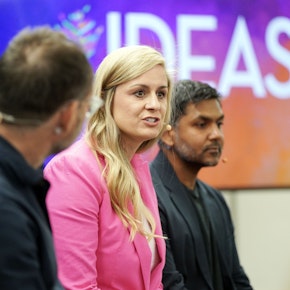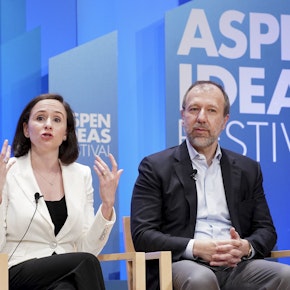Explore
Search results

America’s southern border is a flashpoint for contentious political and cultural disagreements, as well as the site of a growing humanitarian crisis that existing laws, policies and institutions seem incapable of addressing. Are there any real solutions in sight?

Donald Trump’s America First philosophy and his retreat from international alliances led pundits to dub Germany’s Angela Merkel the new leader of the free world, but today’s global leadership appears more muddled than ever, especially as Brexit and unrest in Italy threatens the integrity of the European Union. Across the Pacific and Africa, countries are being forced to re...

Since the dawn of the Olympics, sports have been a contest of global powers. Today, how are sports used as a means of conducting foreign policy — for better and for worse?

Over 1 million people globally are held as political prisoners. Two of the leading human rights attorneys working to release captives of authoritarian regimes and the mother of an American journalist kidnapped and killed by terrorists raise awareness about the struggles to win freedom for prisoners often forgotten.

Revolutions in technology, politics and economics bring progress — but they also invite backlash. Fareed Zakaria discusses the rise of the modern republic through the Industrial Revolution to the age of globalization, and the reemergence of great power politics.

In the last decade, the people of democratic societies across the globe have elected autocratic leaders. These populist strongmen have undermined democratic institutions with a disregard for the rule of law, expertise, and the truth. Is their election the symptom of already advanced societal illnesses, or is it the disease itself? In countries where the damage to democracy...

Demagogues promise a return to an imaginary past. The opposite of demagogues — politicians — focus on visions of a glorious future. The New Yorker’s Masha Gessen, author of The Future Is History: How Totalitarianism Reclaimed Russia, explores a number of such visions — visions of a more equal, sustainable life, visions of the common good and inclusive politics — as express...

Is Islam, in fact, "exceptional" in how it relates to politics? Shadi Hamid argues for a new understanding of how Islam and Islamism shape politics by examining different models of reckoning with the problem of religion and state, including the terrifying—and alarmingly successful—example of ISIS. With unprecedented access to Islamist activists and leaders across the regio...

Globalization ushered in an era of free trade, fluid borders, and unparalleled corporate profits. For its proponents, the global integration of states and their economies was a political and economic win that created a wealth of opportunities for workers and consumers around the world. But in the United States, jobs are disappearing in construction zones, clerical offices,...

The US government misjudged the rise of China over the last decade — as the country has grown in economic power, it's become more rambunctious internationally, not less. Its Belt and Road Initiative is winning over countries that used to be US allies. It’s expanding its military power and reach in the South China Sea, attacking US companies in cyberspace, and advancing in...

Why do some leap ahead while others fall behind in today’s chaotic, connected world? Two visionary thinkers take you on a whirlwind tour of the 21st century, revealing how "new power" — open, participatory, and peer-driven — is reshaping politics, business, and society. New power works like a current, not a currency — and it is most forceful when it surges — and understand...

Russia’s invasion of Ukraine has upended settled arrangements of the balance of geopolitical power and raised questions about the US approach to foreign affairs more broadly. What does the conflict in Europe mean for the challenges presented by China and other actors on the global stage? What will US leadership in the Middle East look like going forward? Has the volatility...

Cities are responsible for 70 percent of global carbon emissions, and by 2050, two out of every three people will live in one. Fortunately, cities are getting serious about environmental footprint — New York announced its own Green New Deal, Melbourne aims to be carbon neutral by 2020, and Los Angeles will use 100 percent renewable energy by 2045. Mayors are often more nim...

Through the rise of European populism — from Brexit in the West to Orban in the East, from the Swedish far right in the North to the Italy's Northern League in the South — European politics and economics have been completely altered by the emergence and strengthening of populist movements. But what are the economics behind the erosion of the centre in Europe and where is i...

Under Xi Jinping, China has become more authoritarian at home and more aggressive overseas. As China becomes increasingly economically dominant, what are the economic, political, and military realities of America’s most important “frenemy”? Panelists with unique insights into the world’s most populous country give us an in-depth look.

In any city in the world, an extremist could explode your subway car, yet surveillance and security are more advanced than ever. Ebola ravaged thousands for months and now Zika continues its creep around the globe, yet life expectancy and healthcare are more advanced than at any other time in human history. A slowing Chinese economy and falling oil prices warn of a global...

After decades with no significant geopolitical rivals, the United States now faces the emergence of China as a major adversary. How will this change the landscape of the emerging world order? What new forms of geopolitical conflict will arise, and what new forms of cooperation are necessary?

Richard Haass, president of the Council on Foreign Relations, and Rana Foroohar, global business columnist of the Financial Times, examine American foreign policy and the crisis of the old order. Given 21st century challenges posed by terrorism, climate change, and cyberwarfare within a context in which the policies and institutions that have guided us for decades no longe...

China’s economy is slowing and the world has no choice but to pay attention. And in Beijing, Xi Jinping’s administration pursues policies increasingly divergent from democratic ideals. These developments are philosophically challenging, especially as they concern the world’s largest population and second-largest economy. And yet they also pose threats to multilateral coope...

Authoritarian populists are gaining power from Ankara to Athens, from Warsaw to Washington. Meanwhile, popular support for democratic values is sliding in many countries around the world. Is our political system in existential danger? And what can we do to save it?

